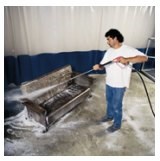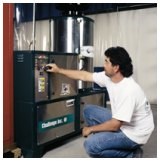Pretreatment for Powder Coating
AG's goal was to develop a finishing line that combined quality and consistency with flexibility...
Component parts for the aerospace industry, hightech medical devices, information storage systems, and machinery to make Chicken McNuggets® are among the specialties of AG Machining & Industries, a contract manufacturer in Englewood, Colorado.
AG is a high-precision shop. The company uses CAP (ComputerAided Processing) throughout the manufacturing cycle, employs the latest calibration, materials tracking and archiving protocols, and has full SPC capabilities.
AG Machining was founded in 1979 as a CNC machining center. Sheet-metal laser fabrication was added in 1992, followed by welding and assembly. The company's most recent capability is powder coating.
"In 1996," said Owner/President Art Gelwick, "the volume of work we sent out for powder coating was huge and growing every month. Quality was good, but the logistics were ridiculous. Parts had to be individually wrapped and prepared for shipment. They were then trucked 10 miles to the powder coater, unpacked, processed and repacked. We would then pick them up and bring them back here, where we would unpack and inspect them prior to sending them to the silk-screener. This, of course, called for yet another round of packing and unpacking before we could install some hardware, do final inspection and ship to our customer."
As with the other facets of the business, Mr. Gelwick's goal in selecting a finishing system was to combine quality and consistency with substantial process flexibility.
 |
| Parts progress through the pretreatment system. |
The company started with cleaning and pretreatment. This was a formidable task given the wide range of substrates, several types of coldrolled steel plus aluminum. Also product sizes and shapes varied tremendously; and volume and prototypes all the way to automotive production numbers added more challenges.
Mr. Gelwick consulted Robert Westby, a Denver-based metal finishing consultant whose client base includes aerospace, automotive and specialty metalworking manufacturers. Mr. Westby recommended a two-tier strategy: a dip line for parts that could be accommodated in four-by-four-by-five-ft tanks, and a recently developed stationary spray wand system, called PhosPro, which would be used for large or very heavy components such as security safes and subassemblies.
Both systems would use cleaners and pretreatment chemistries supplied by Challenge, Inc., Indianapolis, Indiana. Challenge manufactures environmentally compliant, chromiumfree, zero-VOC cleaners, phosphates, rinses, booth coatings and other products used by painters and platers. The company is known for its pioneering work with biodegradable polymers and does a substantial business with proprietary waterborne coating development. All products are manufactured to ISO-9002 Quality Standards.
The PhosPro stationary spray wand system was introduced in 1996 as a singlestage alternative to conventional, multistage pretreatment systems. Engineered for production environments, it features a seven-and-a-half-hp motor that delivers five gpm at a maximum 1,800 psi. Its fixed-orifice injector delivers a precise ratio of chemical without ongoing calibration. Downstream injection provides the fastest possible cleaning while preventing chemical contamination of system components.
The PhosPro uses Clean `N Coat 3000, a nonmolybdate cleaner/phosphate for use on steel, aluminum and zinc substrates.
 |
| Phosphate cleaning system parameters are easily established. |
The process outlined by Mr. Westby for the immersion line includes Challenge 1006/1231, a flexible, alkaline-mixed metal cleaner that runs at low operating temperatures, and Challenge Clean `N Coat 3011, an organic hybrid cleaner/phosphate engineered specifically for recirculating systems. It is capable of depositing 4060 mg of coating weight, a specification that puts Clean `N Coat 3011 in the category of an appliancegrade iron phosphate. Other dip-line stages include 2531 Aluminum Desmutter, water rinse and a chromate that allows a conversion coating to be applied to aluminum.
The final stage of the immersion line is Rinse 6106, a reactive organometallic phosphate sealing rinse. Rinse 6106 is based on an inorganic polymer that is proprietary. It combines exceptional resistance to salt spray (500+ hours) and humidity with extraordinary intercoat adhesive capability. It often outperforms reactive chromium at concentrations as low as 0.5 pct by volume. The product requires just one titration and no separate pH adjustment.
These products give AG Machining the basis required for effective, consistent powder coating. Of equal importance, however, is that they allow AG to, in Mr. Westby's words, "operate a true closed-loop system outside the clutches of those $400-an-hour hazmat consultants."
Key to this capability is an evaporator developed by Mr. Westby. Overflow rinse waters from the dip line, and a small quantity of chemical from the PhosPro operation, are gravityfed to a holding tank; when full, material is pumped to the evaporator. The evaporator features a 550,000 Btu burner and runs "on demand." It is fueled with natural gas, thus utility expense is low. The evaporator has level switches for water level minimum (to prevent burner exposure and failure); for startup; for pump shutoff; and alarming in event of system anomaly.
 |
| Spray wand phosphating is used for cleaning large parts. |
"The system is inherently failsafe," said Mr. Gelwick, "and we run it unattended 24 hours a day, including weekends. It is a safety thing. If a tank breaks on Sunday morning, we are covered. We know immediately if something is not right."
The evaporator also accepts excess water from tumbling operations. Sixstage baffling isolates the fines. "Gray water" is then commingled with other material in the evaporator. Aluminum and steel fines are retrieved by individual scrap haulers. Tumbling sludge is dried and shipped to a landfill.
Always planning ahead, Mr. Gelwick is aggressively pursuing IS0-9000 certification. Eventually, he plans to offer finishing services on a selective basis to other manufacturers and job shops. These would be companies like us," he said, "who aren't looking for your average `spray and pay' operation, but who demand truly top quality work, consistently, on-time and cost-effectively."
Related Content
Adjusting Current and Voltage When Powder Coating
Which manual powder coating gun setting is better to adjust, voltage or current? Jeff Hale of Gema USA discusses when to use different settings on your powder gun to achieve optimal results.
Read MoreMasking Solutions Provider CFS Dramatically Expands Capabilities and Capacity
Custom Fabrication & Supplies (CFS) completed a new plant expansion packing 10 times the capacity into twice the space. It dramatically enhances the supplier’s custom capabilities to provide extremely precise and cost-effective masking solutions.
Read MoreSelecting the Right Outdoor-Durable Powder Coating
The powder coating industry offers an array of chemistries to provide an excellent match to the manufacturer’s expectations for outdoor durability.
Read MoreAn Altruistic Growth Strategy Puts People First
Professional Plating emphasizes investing in its team and fostering a supportive environment on the shop floor.
Read MoreRead Next
Education Bringing Cleaning to Machining
Debuting new speakers and cleaning technology content during this half-day workshop co-located with IMTS 2024.
Read MoreDelivering Increased Benefits to Greenhouse Films
Baystar's Borstar technology is helping customers deliver better, more reliable production methods to greenhouse agriculture.
Read MoreA ‘Clean’ Agenda Offers Unique Presentations in Chicago
The 2024 Parts Cleaning Conference, co-located with the International Manufacturing Technology Show, includes presentations by several speakers who are new to the conference and topics that have not been covered in past editions of this event.
Read More
























